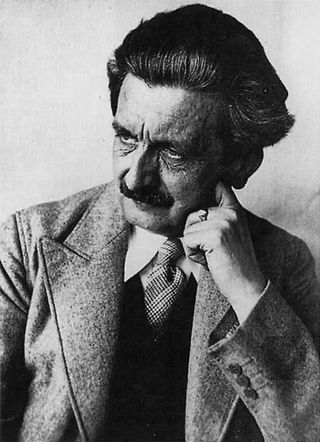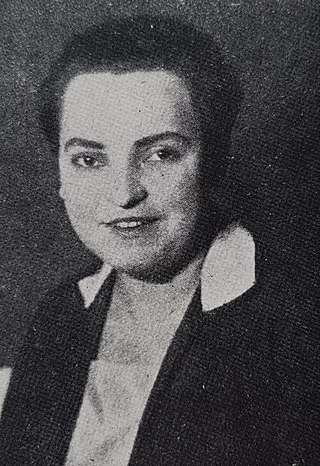
Ilse Kokula (born January 13, 1944) is a German sociologist, educator, author and lesbian activist [1] in the field of lesbian life. She was awarded the Order of Merit of the Federal Republic of Germany.

Ilse Kokula (born January 13, 1944) is a German sociologist, educator, author and lesbian activist [1] in the field of lesbian life. She was awarded the Order of Merit of the Federal Republic of Germany.
Ilse Kokula was born in Żagań, Silesia in 1944, [2] grew up in Franconia, and has been living in Berlin since 1971. As the eldest daughter with eight siblings, only one auxiliary job was planned for her, which is why she already had to fight for her apprenticeship as a cook. She sought and found support so that she could catch up on her schooling and study social work at the Higher Technical College. She successfully completed her studies in Bavaria in 1967.
After a few years as a social worker, Kokula attended the Berlin College of Education and enrolled in pedagogy. She wrote her diploma thesis about the lesbian group of the LAZ (Lesbian Action Center West Berlin), in which she herself was active. In the mid-1970s, when lesbians were socially still hushed up, Kokula published this work under the pseudonym "Ina Kuckuck" under the title "The fight against oppression" in the publishing house Frauenoffensive in Munich. She then worked in practice for several years before obtaining a doctorate in sociology at the University of Bremen in 1982. The result was two more books: Female Homosexuality around 1900 and Forms of Lesbian Subculture. In 1985, Kokula was appointed by the University of Utrecht as the first visiting scholar for "social history and socialization of lesbian women" on a special chair and thus received the title of professor. [3]
She taught, learned and made many contacts and then worked for several years as a freelance researcher and lecturer, until she became an equal opportunity officer of the Gender Equality Department of the Senate of Berlin in West Berlin in the year of the fall of the Berlin Wall (1989).
There, she presented topics at conferences, for discussion. such as the questions of persecution of homosexuals in Nazi Germany and the Holocaust should be commemorated, how city authorities could promote lesbian and gay emancipation, or what history and perspectives lesbians and gays would have in the new federal states (formerly GDR). These and many other discussions were published in the "Lesbian-Gay Emancipation Documents" section of the Homosexual Lifestyles Unit (edited by the Senate Department for Youth and Family, Berlin). [4]
For more than four decades, Kokula has been connecting different levels: as a researcher, she published pioneering works on the present and history of lesbian women as early as the 1970s and early 1980s, on the basis of which younger researchers in history, sociology, psychology and literary studies could build. [5] Kokula has worked as a political fighter in the women and lesbian movement (including women's group of homosexual action West Berlin, short: HAW), later Lesbian Action Center West Berlin, in the journals UKZ – "Our little newspaper" and the "Swiss Lesbian Front"). She has also maintained lesbian- gay co-operation (among other things the lesbian-gay trade union group of the ÖTV established, [6] and at the exhibition "Eldorado: Homosexual women and men in Berlin 1850–1950", which took place in 1984 in Berlin. [7]
Kokula connected many lesbians from East and West, from the Netherlands, Austria, Switzerland and Germany before the fall of the Berlin Wall in 1989 and thereafter. As the first equal opportunities officer in the "Department for same-sex lifestyle of the Berlin Senate" has brought them from 1989 to 1996 numerous topics through meetings and publications in the social debate and in the "Community Lesbian and gay politics" of the district office Berlin-Charlottenburg Expert participated.
Kokula was a committed member of the women's and lesbian movement (including the founding founder of the Foundation for the Archive of the German Women's Movement [8] ). As a lesbian researcher and emancipation fighter, the role of a gender equality officer in the administration was a source of tension inside and outside the institutions and stakeholders. [9] After seven years, Ilse Kokula left this post and moved her field of activity into the field of youth protection.
Since her retirement in 2004, she has been working as a volunteer at the Frieda Women's Center in Berlin, [10] where she regularly organizes lectures and discussions on various aspects of lesbian life. [11]

Magnus Hirschfeld was a German physician, sexologist and LGBTQ advocate, whose citizenship was later revoked by the Nazi government. Hirschfeld was educated in philosophy, philology and medicine. An outspoken advocate for sexual minorities, Hirschfeld founded the Scientific-Humanitarian Committee and World League for Sexual Reform. He based his practice in Berlin-Charlottenburg during the Weimar period. Performance Studies and Rhetoric Professor Dustin Goltz characterized the committee as having carried out "the first advocacy for homosexual and transgender rights".

Gustav Adolf Franz Brand was a German writer, egoist anarchist, and pioneering campaigner for the acceptance of male bisexuality and homosexuality.
Ernst Otto Burchard was a German physician, sexologist, and gay rights advocate and author. Burchard, who was gay, testified as an expert witness in several court cases involving prosecutions on grounds of Paragraph 175, which criminalized homosexual practices.

The Memorial to Homosexuals persecuted under Nazism in Berlin was opened on 27 May 2008.

The Schwules Museum in Berlin, Germany, is a museum and research centre with collections focusing on LGBTQ+ history and culture. It opened in 1985 and it was the first museum in the world dedicated to gay history.
Ruth Margarete Roellig was a German writer, she is known for documenting Berlin's lesbian club scene of the late 1920s during the Weimar Republic. Additionally she published support of Nazism starting in the 1930s, and she stopped writing after the end of World War II.
This is a list of events in Lesbian, Gay, Bisexual, Transgender, Queer and Intersex (LGBTQ+) history in Germany.

Die Freundin was a popular Weimar-era German lesbian magazine published from 1924 to 1933. Founded in 1924, it was the world's first lesbian magazine, closely followed by Frauenliebe and Die BIF. The magazine was published from Berlin, the capital of Germany, by the Bund für Menschenrecht, run by gay activist and publisher Friedrich Radszuweit. The Bund was an organization for homosexuals which had a membership of 48,000 in the 1920s.

Selma "Selli" Engler was a leading activist of the lesbian movement in Berlin from about 1924 to 1931.
Gay balls, cross-dressing balls, pansy balls, or drag balls were public or private balls that were celebrated mainly in the first third of the 20th century, where cross-dressing and ballroom dancing with same-sex partners was allowed. By the 1900s, the balls had become important cultural events for gays and lesbians, even attracting tourists. Their Golden Age was during the interwar period, mainly in Berlin and Paris, even though they could be found in many big cities in Europe and the Americas, such as Mexico City and New York City.

The German Democratic Republic, or GDR, a state in Central Europe that existed from 1949 to 1990 before being absorbed by the Federal Republic of Germany (FRG), was dominated by heterosexual norms. However, East Germany decriminalised homosexuality during the 1960s, followed by increasing social acceptance and visibility.
Herta Leistner is a German is a practitioner of social pedagogy, a teacher and an author. She is a Deaconess of the Evangelical Church who has come to wider prominence as a pioneer of the lesbian liberation movement inside the church.

Die BIF – Blätter Idealer Frauenfreundschaften, subtitled Monatsschrift für weibliche Kultur, was a short-lived lesbian magazine of Weimar Germany, published from either 1925 or 1926 until 1927 in Berlin. Founded by lesbian activist Selli Engler, Die BIF was part of the first wave of lesbian publications in history and the world's first lesbian magazine to be published, edited and written solely by women.

Charlotte "Lotte" Hedwig Hahm was a prominent activist of the lesbian movement in Berlin during the Weimar Republic, National Socialist period, and after 1949, in the Federal Republic of Germany.

The Eldorado was the name of multiple nightclubs and performance venues in Berlin before the Nazi era and World War II. The name of the cabaret Eldorado has become an integral part of the popular iconography of the Weimar Republic. Two of the five locations the club occupied in its history are known to have catered to a gay crowd, although attendees would have included not only gay, lesbian, and bisexual patrons but also those identifying as heterosexual.

In Nazi Germany, gay women who were sent to concentration camps were often categorized as "asocial", if they had not been otherwise targeted based on their ethnicity or political stances. Female homosexuality was criminalized in Austria, but not other parts of Nazi Germany. Because of the relative lack of interest of the Nazi state in female homosexuality compared to male homosexuality, there are fewer sources to document the situations of lesbians in Nazi Germany.

The first homosexual movement thrived in Germany from the late nineteenth century until 1933. The movement began in Germany because of a confluence of factors, including the criminalization of sex between men and the country's relatively lax censorship. German writers in the mid-nineteenth century coined the word homosexual and criticized its criminalization. In 1897, Magnus Hirschfeld founded the world's first homosexual organization, the Scientific-Humanitarian Committee, whose aim was to use science to improve public tolerance of homosexuality and repeal Paragraph 175. During the German Empire, the movement was restricted to the wealthy elite, but it greatly expanded in the aftermath of World War I and the German Revolution.
Ursula Sillge is a German sociologist and LGBT activist. She organized the first national lesbian gathering in East Germany, and between 1970 and 1990 was one of the main lesbian activists in the country, pressing authorities to recognize the rights and allow visibility of the LGBT community. In 1986, she founded the Sunday Club in Berlin. It was the only secular association representing homosexuals in the 1980s, though it was not officially recognized. The organization became the first legal association to represent the LGBT community in East Germany when it was allowed to register in 1990. Sillge resigned as director of the Sunday Club in 1991 to found the LGBT archive known as the Lila Women's Archives. After the fall of the Berlin Wall, she was able to earn her doctorate. In addition to running the archives, she has published several works about homosexuality and women behind the Iron Curtain.
Käthe "Kati" Reinhardt, born Katharina Erika Selma Reinhardt, was a German activist in the lesbian movement. She was a formative figure in Berlin's lesbian subculture from the time of the Weimar Republic to the early 1980s as an organizer of clubs, balls, and meetings, and as a bar operator. In the 1920s she ran the largest clubs for the lesbian movement, which served up to 2,000 people, and worked, among others, with Charlotte “Lotte” Hahm.
Hedwig Emma Käthe "Kitty" Kuse was an activist for lesbian emancipation in Germany after the Second World War. She founded the first group for older lesbian women and was the founder, editor and author of the monthly magazine UKZ – Unsere kleine Zeitung.